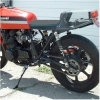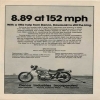wasted spark and fuel octane
- Patton
-
 Topic Author
Topic Author
- Offline
- KZr Legend
-

Registered
- Posts: 18568
- Thanks: 2101
wasted spark and fuel octane
24 Apr 2011 11:16... IMO an engine that is using a wasted spark system can benefit from a higher octane fuel....
:huh:
1973 Z1
KZ900 LTD
KZ900 LTD
Please Log in or Create an account to join the conversation.
- otakar
-

- Offline
- User
-

Registered
- Posts: 5073
- Thanks: 29
Re: wasted spark and fuel octane
24 Apr 2011 11:25
Where did that come from???
74 Z1-A stock
76 KZ-900 Totaly stock vice MAC pipe
77 KZ-1000A stock
78 Z1-R 100%MINT 500 original Mi.
78 Z1-R Yoshi 1103 kit stage 1 cams Yoshi pipe. Etc
79 KZ-1300 (1400)
80 KZ-1300
81 Scratch built GPz1150R
82 KZ1000
76 KZ-900 Totaly stock vice MAC pipe
77 KZ-1000A stock
78 Z1-R 100%MINT 500 original Mi.
78 Z1-R Yoshi 1103 kit stage 1 cams Yoshi pipe. Etc
79 KZ-1300 (1400)
80 KZ-1300
81 Scratch built GPz1150R
82 KZ1000
Please Log in or Create an account to join the conversation.
- steell
-

- Offline
- User
-

Registered
- Posts: 6849
- Thanks: 208
Re: wasted spark and fuel octane
24 Apr 2011 11:25Patton wrote:... IMO an engine that is using a wasted spark system can benefit from a higher octane fuel....
:huh:
Where did this come from?
"Huh" is exactly the right response :laugh:
KD9JUR
Please Log in or Create an account to join the conversation.
- otakar
-

- Offline
- User
-

Registered
- Posts: 5073
- Thanks: 29
Re: wasted spark and fuel octane
24 Apr 2011 11:40
No- I think that in this case "WTF" would be a better response. I don,t use that phrase much though.
:whistle: :ohmy:
:whistle: :ohmy:
74 Z1-A stock
76 KZ-900 Totaly stock vice MAC pipe
77 KZ-1000A stock
78 Z1-R 100%MINT 500 original Mi.
78 Z1-R Yoshi 1103 kit stage 1 cams Yoshi pipe. Etc
79 KZ-1300 (1400)
80 KZ-1300
81 Scratch built GPz1150R
82 KZ1000
76 KZ-900 Totaly stock vice MAC pipe
77 KZ-1000A stock
78 Z1-R 100%MINT 500 original Mi.
78 Z1-R Yoshi 1103 kit stage 1 cams Yoshi pipe. Etc
79 KZ-1300 (1400)
80 KZ-1300
81 Scratch built GPz1150R
82 KZ1000
Please Log in or Create an account to join the conversation.
- martin_csr
-

- Offline
- User
-

Registered
- Posts: 8018
- Thanks: 1645
Last edit: 13 Feb 2013 12:57 by martin_csr.
Please Log in or Create an account to join the conversation.
- otakar
-

- Offline
- User
-

Registered
- Posts: 5073
- Thanks: 29
Re: wasted spark and fuel octane
24 Apr 2011 12:17
OK I found it.
"The higher a fuels octane the LESS volatile it is, but the higher the octane the more likely that the fuel will burn in a controlled manner. IMO an engine that is using a wasted spark system can benefit from a higher octane fuel. Lower octane fuel may ignite more easily, but could also ignite more easily at the wrong time."
Boy Is that statement all wrong. Volatility and Octane have absolutely nothing to do with each other. The guy better go back to his research. Even though I THINK I know what he is attempting to say, The premise is Completely wrong.
"The higher a fuels octane the LESS volatile it is, but the higher the octane the more likely that the fuel will burn in a controlled manner. IMO an engine that is using a wasted spark system can benefit from a higher octane fuel. Lower octane fuel may ignite more easily, but could also ignite more easily at the wrong time."
Boy Is that statement all wrong. Volatility and Octane have absolutely nothing to do with each other. The guy better go back to his research. Even though I THINK I know what he is attempting to say, The premise is Completely wrong.
74 Z1-A stock
76 KZ-900 Totaly stock vice MAC pipe
77 KZ-1000A stock
78 Z1-R 100%MINT 500 original Mi.
78 Z1-R Yoshi 1103 kit stage 1 cams Yoshi pipe. Etc
79 KZ-1300 (1400)
80 KZ-1300
81 Scratch built GPz1150R
82 KZ1000
76 KZ-900 Totaly stock vice MAC pipe
77 KZ-1000A stock
78 Z1-R 100%MINT 500 original Mi.
78 Z1-R Yoshi 1103 kit stage 1 cams Yoshi pipe. Etc
79 KZ-1300 (1400)
80 KZ-1300
81 Scratch built GPz1150R
82 KZ1000
Please Log in or Create an account to join the conversation.
- loudhvx
-

- Offline
- KZr Legend
-

Registered
- Posts: 10864
- Thanks: 1619
Re: wasted spark and fuel octane
24 Apr 2011 15:09
Was that posted on April first?
1981 KZ550 D1 gpz.
Kz550 valve train warning.
Other links.
Kz550 valve train warning.
Other links.
Please Log in or Create an account to join the conversation.
- gd4now
-

- Offline
- User
-

Registered
- Denco where did you go?
- Posts: 1535
- Thanks: 567
Re: wasted spark and fuel octane
24 Apr 2011 15:25
I am not an expert, an engineer, or a chemist, but I have always thought of octane rating as the fuels resistance to burn. I can understand how this could certainly be seen as the level of volatility of the fuel.
1977 KZ650 B1
Pods and Denco header
OLD KAW OWNERS SMILE ALOT
Pods and Denco header
OLD KAW OWNERS SMILE ALOT
Please Log in or Create an account to join the conversation.
- 650ed
-

- Offline
- User
-

Registered
- Posts: 15333
- Thanks: 2833
Re: wasted spark and fuel octane
24 Apr 2011 15:36
Ok; let's see what the possibilities are. If I understand it correctly, the "waste spark" happens when the non-firing cylinder of the pair connected to their respective coil is near the end of the exhaust stroke / beginning of the intake stroke. The only way I can see fuel in that cylinder being ignited at the wrong time would be if the ignition timing was set to fire sometime after the piston reached TDC. In that case, the piston would be starting the intake stroke and fuel may have begun being sucked into the cylinder. I don't know, but it seems to me that for the "waste spark" to ignite fuel during the intake stroke (which of course would not be under any compression) the timing would be so far off that the engine probably wouldn't run anyway. I don't believe octane would come into play. Thoughts? Ed
(BTW, I run 93 octane fuel, but not because of any waste spark issue).
(BTW, I run 93 octane fuel, but not because of any waste spark issue).
1977 KZ650-C1 Original Owner - Stock (with additional invisible FIAMM horn)
Please Log in or Create an account to join the conversation.
- steell
-

- Offline
- User
-

Registered
- Posts: 6849
- Thanks: 208
Re: wasted spark and fuel octane
24 Apr 2011 15:53 - 24 Apr 2011 16:18gd4now wrote: I am not an expert, an engineer, or a chemist, but I have always thought of octane rating as the fuels resistance to burn. I can understand how this could certainly be seen as the level of volatility of the fuel.
Octane rating is a fuel's ability to resist detonation
Just do a search for "octane rating" on the web.
Octane rating is related to wasted spark only in an alternative universe, not in this one.
otakar, wasn't it you that used to work next to the lab doing the fuels research at Fermilabs?
Not that it matters a great deal. it's obvious the original poster in the original thread already knows everything and won't be persuaded by facts. And he'll call you a "dick" for pointing out his mistakes.
KD9JUR
Last edit: 24 Apr 2011 16:18 by steell.
Please Log in or Create an account to join the conversation.
- gd4now
-

- Offline
- User
-

Registered
- Denco where did you go?
- Posts: 1535
- Thanks: 567
Re: wasted spark and fuel octane
24 Apr 2011 16:15
OK but what is it that resists dentonation - is it not the resistance to burn?
1977 KZ650 B1
Pods and Denco header
OLD KAW OWNERS SMILE ALOT
Pods and Denco header
OLD KAW OWNERS SMILE ALOT
Please Log in or Create an account to join the conversation.
- steell
-

- Offline
- User
-

Registered
- Posts: 6849
- Thanks: 208
Re: wasted spark and fuel octane
24 Apr 2011 16:23 - 24 Apr 2011 16:42gd4now wrote: OK but what is it that resists dentonation - is it not the resistance to burn?
No, it's the method in which it burns, controlled vs uncontrolled. If resistance to burn was the criteria, then water would have a heck of a octane rating.
Octane rating does not relate to the energy content of the fuel (see heating value). It is only a measure of the fuel's tendency to burn in a controlled manner, rather than exploding in an uncontrolled manner.
More at the KLICKY
And even more:
Kettering assigned Thomas Midgley, Jr. to the task of finding the exact cause of knock [24]. They used a Dobbie-McInnes manograph to demonstrate that the knock did not arise from preignition, as was commonly supposed, but arose from a violent pressure rise _after_ ignition.
And, if you don't read anything else, read this one: Please read!!!
From the above link comes the best definition of octane I've ever read.
Simply put, the octane rating of the fuel reflects the ability of the unburnt end gases to resist spontaneous autoignition under the engine test conditions used. If autoignition occurs, it results in an extremely rapid pressure rise, as both the desired spark-initiated flame front, and the undesired autoignited end gas flames are expanding. The combined pressure peak arrives slightly ahead of the normal operating pressure peak, leading to a loss of power and eventual overheating. The end gas pressure waves are superimposed on the main pressure wave, leading to a sawtooth pattern of pressure oscillations that create the "knocking" sound.
What an absolutely lovely article!! Just can't stop reading (and quoting) :laugh:
6.3) What fuel property does the Octane Rating measure?
The fuel property the octane ratings measure is the ability of the unburnt end gases to spontaneously ignite under the specified test conditions. Within the chemical structure of the fuel is the ability to withstand pre-flame conditions without decomposing into species that will autoignite before the flame-front arrives. Different reaction mechanisms, occurring at various stages of the pre-flame compression stroke, are responsible for the undesirable, easily-autoignitable, end gases.
During the oxidation of a hydrocarbon fuel, the hydrogen atoms are removed one at a time from the molecule by reactions with small radical species (such as OH and HO2), and O and H atoms. The strength of carbon-hydrogen bonds depends on what the carbon is connected to. Straight chain HCs such as normal heptane have secondary C-H bonds that are significantly weaker than the primary C-H bonds present in branched chain HCs like iso-octane [21,22].
The octane rating of hydrocarbons is determined by the structure of the molecule, with long, straight hydrocarbon chains producing large amounts of easily-autoignitable pre-flame decomposition species, while branched and aromatic hydrocarbons are more resistant. This also explains why the octane ratings of paraffins consistently decrease with carbon number. In real life, the unburnt "end gases" ahead of the flame front encounter temperatures up to about 700C due to piston motion and radiant and conductive heating, and commence a series of pre-flame reactions. These reactions occur at different thermal stages, with the initial stage ( below 400C ) commencing with the addition of molecular oxygen to alkyl radicals, followed by the internal transfer of hydrogen atoms within the new radical to form an unsaturated, oxygen-containing species. These new species are susceptible to chain branching involving the HO2 radical during the intermediate temperature stage (400-600C), mainly through the production of OH radicals. Above 600C, the most important reaction that produces chain branching is the reaction of one hydrogen atom radical with molecular oxygen to form O and OH radicals.
The addition of additives such as alkyl lead and oxygenates can significantly affect the pre-flame reaction pathways. Antiknock additives work by interfering at different points in the pre-flame reactions, with the oxygenates retarding undesirable low temperature reactions, and the alkyl lead compounds react in the intermediate temperature region to deactivate the major undesirable chain branching sequence [21,22].
The antiknock ability is related to the "autoignition temperature" of the hydrocarbons. Antiknock ability is _not_ substantially related to:
The energy content of fuel, this should be obvious, as oxygenates have lower energy contents, but high octanes.
The flame speed of the conventionally ignited mixture, this should be evident from the similarities of the two reference hydrocarbons. Although flame speed does play a minor part, there are many other factors that are far more important. ( such as compression ratio, stoichiometry, combustion chamber shape, chemical structure of the fuel, presence of antiknock additives, number and position of spark plugs, turbulence etc.) Flame speed does not correlate with octane.
The declarative answer to your question about resistance to burning:
Flame speed does not correlate with octane
.
KD9JUR
Last edit: 24 Apr 2011 16:42 by steell.
Please Log in or Create an account to join the conversation.
Moderators: Street Fighter LTD
